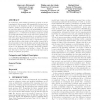Free Online Productivity Tools
i2Speak
i2Symbol
i2OCR
iTex2Img
iWeb2Print
iWeb2Shot
i2Type
iPdf2Split
iPdf2Merge
i2Bopomofo
i2Arabic
i2Style
i2Image
i2PDF
iLatex2Rtf
Sci2ools
ATAL
2011
Springer
2011
Springer
Reasoning about local properties in modal logic
In modal logic, when adding a syntactic property to an axiomatisation, this property will semantically become true in all models, in all situations, under all circumstances. For instance, adding a property like Kap → Kbp (agent b knows at least what agent a knows) to an axiomatisation of some epistemic logic has as an effect that such a property becomes globally true, i.e., it will hold in all states, at all time points (in a temporal setting), after every action (in a dynamic setting) and after any communication (in an update setting), and every agent will know that it holds, it will even be common knowledge. We propose a way to express that a property like the above only needs to hold locally: it may hold in the actual state, but not in all states, and not all agents may know that it holds. We can achieve this by adding relational atoms to the language that represent (implicitly) quantification over all formulas, as in ∀p(Kap → Kbp). We show how this can be done for a rich c...
ATAL 2011 | Epistemic Logic | Intelligent Agents | Knowledge Representation Formalisms | Modal Logics |
Related Content
| Added | 12 Dec 2011 |
| Updated | 12 Dec 2011 |
| Type | Journal |
| Year | 2011 |
| Where | ATAL |
| Authors | Hans P. van Ditmarsch, Wiebe van der Hoek, Barteld P. Kooi |
Comments (0)

